Red Potatoes vs Russet Potatoes: Is Red Potato Better?
As a Certified Health Coach many clients ask me about different potatoes like red and russet. Not all are the same so let’s take a closer look at these two varieties. Let’s answer, what’s the difference between red potatoes and Russet potatoes?
Red potatoes are smaller and rounder than the larger Russet potato which has a more oval shape. Russet potatoes have a brown skin with a white to yellow flesh. Red potatoes have a red skin with a white flesh. Russet potatoes have a thicker, tougher skin and taste starchier than the waxier red potatoes.
This article will do a side-by-side comparison of their nutrients. In addition, I’ll examine their textures, tastes, cooking methods, whether one can substitute for the other and their costs.
In addition to coaching clients about them, I’ve purchased, researched and consumed both prior to, during and after writing this article.
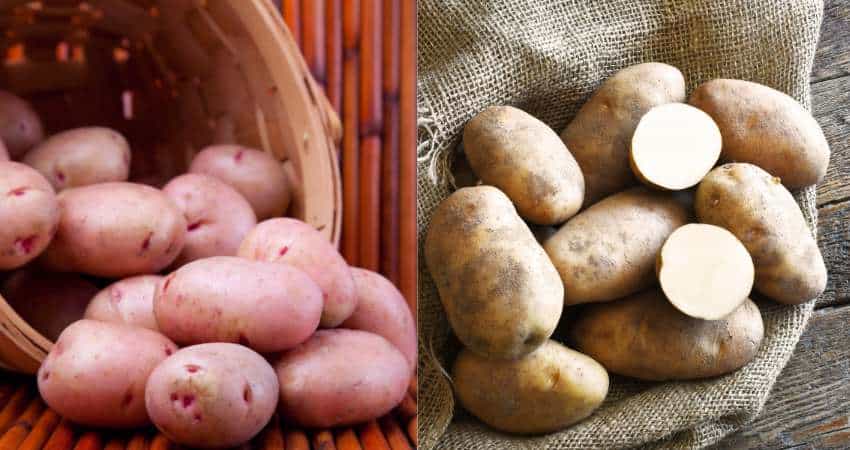
Red Potatoes and Russet Potatoes: Nutrition
You may have heard there is hardly a difference in nutrition between potatoes. This may be true to a certain extent. There are some differences and similarities. So, let’s take a look at the nutrients contained in each one.
The following table is a side-by-side comparison of the nutrients:
| Red Potato Raw (100 g) | Russet Potato Raw (100 g) | |
| Calories | 70 | 79 |
| Protein | 1.89 g | 2.14 g |
| Carbohydrates | 15.9 g | 18.1 g |
| Fiber | 1.7 g | 1.3 g |
| Fat | 0.14 g | 0.08 g |
| Sugar | 1.29 g | 0.62 g |
| Vitamin A | 0 IU | 1 IU |
| Beta-carotene | 0 mcg | 0 mcg |
| Vitamin C | 8.6 mg | 5.7 mg |
| Vitamin B6 | 0.17 mg | 0.34 mg |
| Vitamin B9 (Folate) | 18 mcg | 14 mcg |
| Vitamin B1 (Thiamin) | 0.08 mg | 0.08 mg |
| Vitamin B2 (Riboflavin) | 0.03 mg | 0.03 mg |
| Vitamin B3 (Niacin) | 1.15 mg | 1.04 mg |
| Vitamin B5 (Pantothenic Acid) | 0.3 mg | 0.3 mg |
| Magnesium | 22 mg | 23 mg |
| Phosphorous | 61 mg | 55 mg |
| Potassium | 455 mg | 417 mg |
| Iron | 0.73 mg | 0.86 mg |
| Copper | 0.13 mg | 0.10 mg |
| Calcium | 10 mg | 13 mg |
| Zinc | 0.3 mg | 0.3 mg |
At first glance it may be difficult to determine which variety contains a higher percentage of nutrients. Both of them provide a good number of vitamins and minerals. Let’s answer, which one is healthier?
Red potatoes are healthier than russet potatoes due to their higher percentage of Vitamin C, fiber, B vitamins and minerals. They contain more folate, niacin, phosphorus, potassium and copper. In addition, they contain fewer calories and carbohydrates.
Russet potatoes are no slouch and are very healthy also. They contain more B6, iron and calcium than red. Both of them contain a similar number of thiamin, riboflavin, B5, magnesium and zinc.
The extra vitamin C, fiber and fewer carbs are what gives red potatoes the edge although you can’t go wrong eating either one.
Which is Better for Your Lifestyle
Which one you choose may depend on your goal. People have different goals which may change which variety is desired from person to person. Let’s examine the most common goals.
Weight Loss and Calories
Red potato is better for weight loss due to its fewer calories, carbs and more fiber per serving.
Low Carb Diets and Carbohydrates
Red potatoes are lower in carbohydrates and calories making them better for low carb diets.
Bodybuilding and Muscle Fitness
Russets are better for bodybuilding due to its greater percentage of protein, carbs and calories. The protein helps to repair and build new muscle fibers while the extra carbs help to fuel energy for workouts.
Gluten Free
Russet or red potatoes are both gluten free.
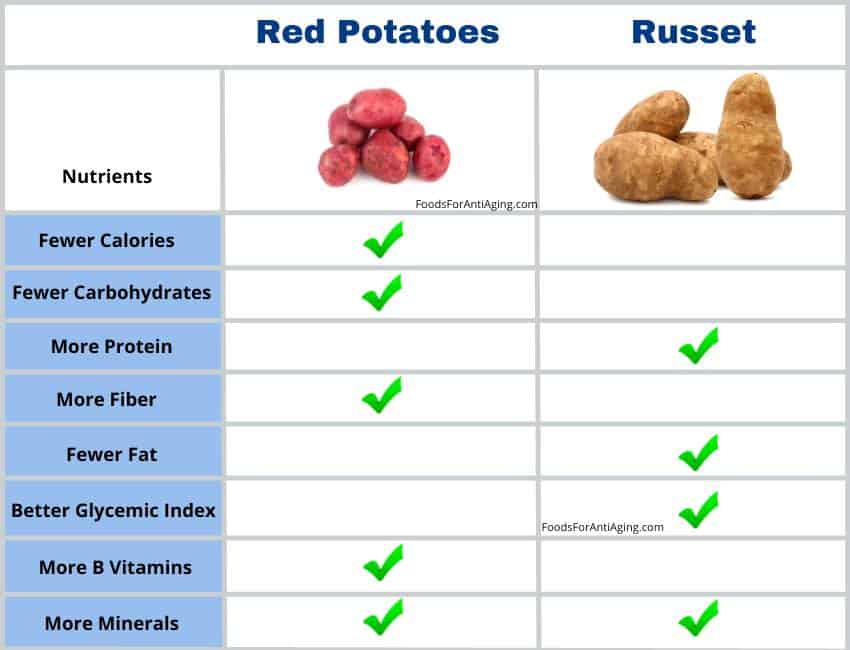
Red Potato and Russet Potato Taste and Texture
Due to a different skin color and size, it’s easy to think they don’t taste the same. Let’s examine the taste and texture of each one.
Red and Russet potatoes have a mild, buttery and unsweet flavor. Red potatoes are less starchy than the creamier Russet. Russets have a thicker and tougher skin to chew after cooked. Red potatoes have a thin skin which is not tough to chew.
Red potatoes have a mild, slightly buttery and earthy flavor. They are less starchy, waxy and dense.
Russets have a neutral, mild flavor which is unsweet. There’s a starchy undertone and the flesh is creamy. If you eat the skin, it is thicker than other types.
To conduct some original research on the tastes, I polled readers, clients and members of food groups. I asked which potato they preferred?
- 46% said they preferred a red potato.
- 41% said they preferred a Russet.
- 13% said it didn’t matter.
To conduct more research I thought it would be fun to set up my own taste test at home. I made mashed potatoes of each variety and seasoned them the same way. 75% chose the russets.
The following video explains how to make the best baked potatoes.
Can You Substitute Russet for Red?
Russets can substitute for red potatoes especially when baking, roasting, mashing or making French fries. Red can substitute for russet when boiling, scalloping, steaming or grilling. Red potatoes are better for soups and potato salad because they hold their shape better when heated.
Red potatoes are best used for the following:
- Soups containing potatoes
- Potato salad
- Stews
- Curry
- Mashed potatoes
- Crispy roasted
- Scalloped
Use Russets for the following:
- Baked
- Tater tots
- Hash browns
- Mashed potatoes
- French fries
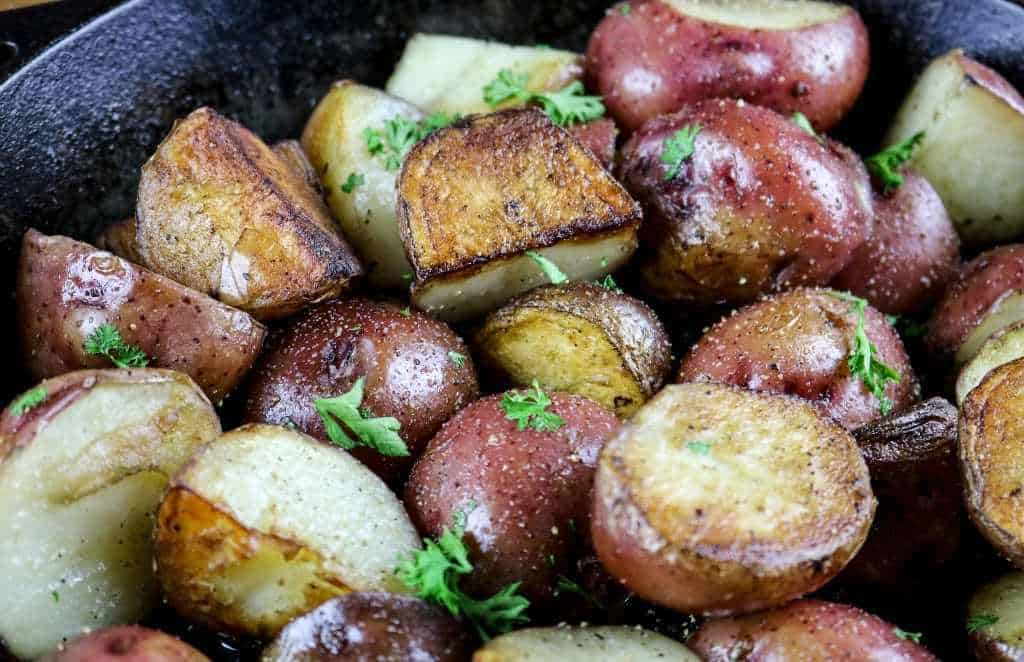
Red potatoes cook faster than Russets due to their smaller size. Boiling times for small red potatoes is 15 minutes and 20-25 minutes for a regular size. The boiling time for Russets is 25 to 30 minutes.
There are a few things you should consider before substituting one for the other.
- Increased cooking times is recommended in recipes when substituting Russet for red. This is due to their larger size.
- If you’re substituting red potatoes for Russet, remember shortening the cooking time.
- The weight quantity of each one called for in recipes doesn’t change when substituting.
Potato Alternatives
If you’re on a low-carb diet, most potatoes are off limits because they are almost pure starch. While most people on this type of diet swear by cauliflower as a perfect substitute, it doesn’t have the same consistency and can be a disappointing experience.
Here are some better non potato alternatives for Russet and red:
- Kohlrabi
- Daikon radish
- Turnips
- Celery root
- Rutabaga
Many of these can be used as French fries or in dishes like Au gratin or scalloped. If you want something to replace mashed potatoes, you might try parsnips, which are related to carrots.
Here are some other potatoes which can be red potato alternatives:
- Yukon Gold potatoes
- Yellow potatoes
- White potatoes
- Red Bliss potatoes
- Baby potatoes
- Fingerlings potatoes
Here are some other potatoes which can be Russet potato alternatives:
- Carola potatoes
- Yukon Gold potatoes
- Inca gold potatoes
- Katahdin potatoes
- Red Bliss potatoes
- Fingerlings potatoes
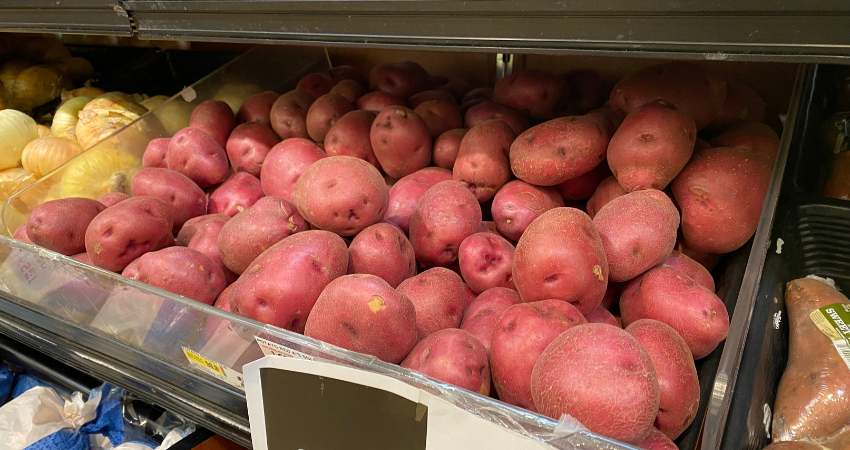
Which of the Two Potatoes Cost More?
With the rising prices of everything, the cost of food or potato may be a consideration. The price may sway your decision about which potato to use. Therefore, let’s examine the prices of each one.
Red potatoes and Russet potatoes have a similar price. The average cost for both is $0.99 per pound for loose, large potatoes.
To conduct original research, I visited some local supermarkets to check the prices of potatoes myself.
I first visited the Shoprite supermarket for the prices:
- Red potatoes
- $0.99 per pound
- Russet potatoes
- $0.99 per pound
I then checked Walmart:
- Red potatoes
- $0.98 per pound
- Russet potatoes
- $0.98 per pound
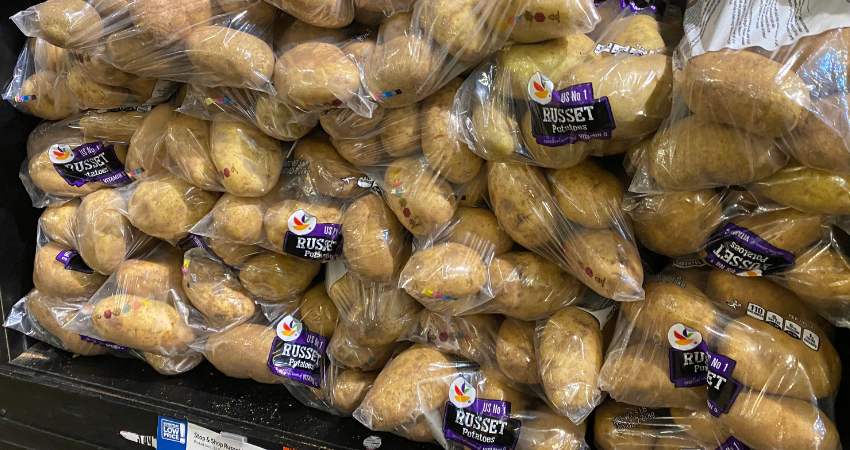
How to Store
How to properly store a potato may make a difference when choosing one over the other. In addition, you’ll want either one to last as long as possible. Therefore, let’s take a close look at how to store each potato.
Store red potatoes or Russet potatoes in a dark place away from heat. Both should be kept out of the refrigerator. A humid basement or root cellar is the best area. They should be kept in a burlap bag or ventilated container and stored between 40°F and 60°F.
Storing potatoes in a refrigerator can change the cell structure, make the center hard and diminish the flavor. If you don’t have a cool basement, be sure to store them in a ventilated place, away from heat and light.
Don’t wash them before storing them. This is especially tempting with Russets picked out of a supermarket bin. The moisture will promote the growth of bacteria and fungus3.
Why store in a humid basement? Potatoes are approximately 80% water and will dry out if not stored in a humid location. Commercial storage facilities store them at 90 to 95% relative humidity.
Typically, the storage is the same for all varieties, including purple potatoes.
Find out if Idaho and Russet are really the same in my article my article.
If you’re interested about how pumpkin compared for health and nutrition, check out my comparison article.
Glycemic Index
Knowing the glycemic index of potatoes is important especially if blood sugar levels are a concern. Blood sugar levels are an important thing people should be aware of, diabetic or not.
The Glycemic Index (GI) is a scale measuring how fast a particular food raises the blood sugar in the blood4. Blood sugar spikes can lead to health complications with the kidneys, nerves, heart and eyes5.
Foods on the GI scale are categorized as:
- Low-GI foods: 55 or under
- Medium-GI foods: 56-69
- High-GI foods: 70 or over
How blood sugars levels are affected:
- Foods with a glycemic index 70 or more cause a more quicker spike in blood sugar levels.
- Foods with a glycemic index 56 to 69 cause a moderate spike in blood sugar levels.
- Foods with a glycemic index 55 or less cause a slow spike in blood sugar levels.
If you’re wondering which of the two foods has a higher GI, let’s take a closer look at each potato.
Russet potatoes have a lower GI than red potatoes depending on the cooking method used. A boiled russet has a GI of 54, and a boiled red has a GI of 89.
Not every potato has an equal GI. Russet and other red or white potatoes all have different GI scores. In addition to how it is cooked, the heat of it when eaten affects the GI.
A study published in the Journal of the Diabetic Association found boiled potatoes eaten cold had a GI score of 56. When eaten hot the potato had a GI score of 896.
Find out how white sweet potatoes compared in my article here.
Health Benefits
Vitamin C
Red potatoes contain 8.6 mg of vitamin C per 100 grams. Vitamin C acts as an antioxidant and helps with the following:
- Collagen production.
- Help maintain healthy gums.
- Prevent damage to cells.
- Increases iron absorption.
- May help boost the immune system.
- Help heal wounds.
Potassium
Red potatoes provide 455 mg of potassium. Potassium helps the body get rid of excess sodium reducing fluid build-up. These help keep systolic and diastolic blood pressure lower ((American Heart Association: How Potassium Can Help Control High Blood Pressure)).
According to Harvard Health, a number of studies have shown a connection between low potassium levels and high blood pressure7. The more potassium, the more sodium your body will lose.
Consuming too much sodium or not enough potassium throws off the delicate balance the kidneys need to remove the excess water8.
Fiber for Gut Health and Digestion
They both contain fiber. Fiber remains in the digestive tract and provides gut related health benefits. Fiber rich diets have been linked to regular bowel movements and a lower risk of colon cancer9.
B Vitamins
The B vitamins provided include the following:
- B1 (thiamin)
- B2 (riboflavin)
- B3 (niacin)
- B5
- B6
- B9 (folate)
- B12
B vitamins help support the following:
- Brain function.
- Nerve function.
- Red blood cells.
- Cardiovascular disease.
- Digestion.
- Energy levels.
Find out how taro compared in my article here.
A lack of B vitamins has been associated with oxidative stress and neural inflammation. In a study released in 2018 32 healthy adults were given B vitamin supplementation for six months. The results indicated preliminary evidence B vitamin supplementation reduced oxidative stress and inflammation10.
If you have any questions about this article don’t hesitate to email us. You can find an email on our contact page.
Read Next – More Food Articles!
Red Potatoes vs Yukon Gold Potatoes: What’s The Difference?
Sweet Potato vs. Butternut Squash: A Comparison
Purple Sweet Potato vs Sweet Potato: What’s The Difference?
Are Sweet Potatoes Healthier Than Regular Potatoes?
Sweet Potato vs. Russet Potato: What’s The Difference?
Yukon Gold Potato vs Russet Potato: What’s The Difference?
- USDA: Potatoes, russet, flesh and skin, raw [↩]
- USDA: Potatoes, red, flesh and skin, raw [↩]
- University of Idaho: Options for Storing Potatoes at Home [↩]
- Harvard Health Publishing: Glycemic index for 60+ foods [↩]
- National Institute of Diabetes and Digestive and Kidney Diseases: Know Your Blood Sugar Numbers: Use Them to Manage Your Diabetes [↩]
- National Center for Biotechnology Information: Glycemic index of potatoes commonly consumed in North America [↩]
- Harvard Health: Potassium lowers blood pressure [↩]
- National Center for Biotechnology Information: The Effect of the Sodium to Potassium Ratio on Hypertension Prevalence: A Propensity Score Matching Approach [↩]
- National Center for Biotechnology Information: Mechanisms linking dietary fiber, gut microbiota and colon cancer prevention [↩]
- National Center for Biotechnology Information: The Effect of a High-Dose Vitamin B Multivitamin Supplement on the Relationship between Brain Metabolism and Blood Biomarkers of Oxidative Stress: A Randomized Control Trial [↩]
